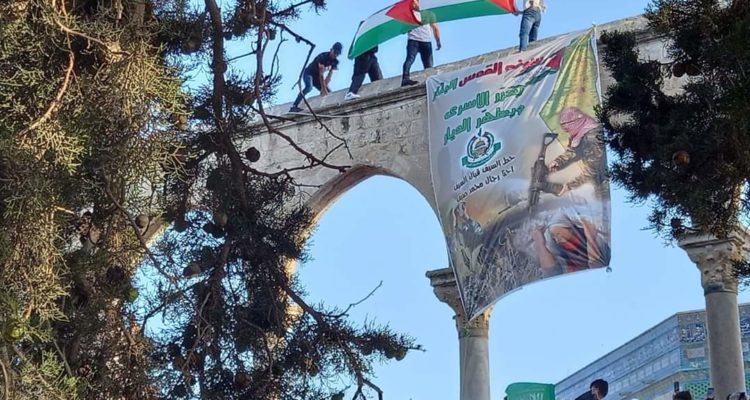“If these three things don’t happen, unfortunately, we’ll see a wave of terror sweeping through Israel,” said Maor Tzemach, founder of Jerusalem NGO.
By Lauren Marcus, World Israel News
Sunday’s deadly Old City terror attack took many by surprise. The perpetrator, an educated, middle-aged father who worked as an Islamic studies teacher, didn’t fit the typical terrorist profile of an angry, unemployed young man.
But for Maor Tzemach, the attack marks the cementing of Hamas’ presence in Jerusalem, a reality of which he has long warned Israeli authorities.
The founder of NGO Your Jerusalem, Tzemach has previously sounded the alarm about widespread incitement in Arab schools, Hamas agents using eastern Jerusalem mosques as operational bases, and the presence of Hamas operatives on the Temple Mount.
The perpetrator, Fadi Abu Shkhaydam, was a member of Hamas’ political wing.
Thanks to a weakening Palestinian Authority led by a wildly unpopular leader and slipping Israeli sovereignty in the capital city, Hamas has officially gained a serious foothold in Jerusalem.
“The real Palestinian Authority elections in Jerusalem are happening in the street, and so far the winner is Hamas,” Tzemach told World Israel News.
A ‘very respectable’ terrorist
Sunday’s incident demonstrates a disturbing reality – that starting from the Temple Mount, the radius of no-go zones for Jews in Jerusalem is ever expanding, and even respected members of eastern Jerusalem communities are willing to commit murder to advance Hamas’ cause.
“Less than 200 meters away from the Western Wall, a Hamas operative with a master’s degree, a schoolteacher, a very respectable man from Shuafat, a religious man, a 42-year-old father, committed a terror attack which killed Eli Kay in a horrendous way,” Tzemach said.
He also noted the attack took place “just a few meters away from an elementary school in the Jewish Quarter,” and said it was a “miracle that the attack yesterday didn’t end even worse than it did.”
Tzemach pointed out that because Abu Shkhaydam taught Islamic studies in a Jerusalem school, he was a salaried employee of the Jerusalem municipality.
But even more shocking than the fact that a Hamas terrorist received paychecks funded by Israeli taxpayers is that Abu Shkhaydam had the opportunity to shape young, impressionable minds for years.
“It’s very interesting to consider what he taught [his students] there, and not an easy question to answer,” Tzemach told WIN. “A person like this taught in an official Israeli school. Did he educate his students to hate Israel and hurt Jews?”
Judging by a recent statement from one of Abu Shkhaydam’s students, the answer is likely yes.
On Sunday, Shuafat local Mustafa Za’atra, a young boy who studied under the terrorist, told Arabic-language al-Qastal that “he was the best teacher. He never cursed anyone, or called anyone a bad name, except the Jews, may God burn them.”
Boiling point
Yesterday’s attack made international headlines because it marked the first killing of an Israeli civilian in a terror attack since Operation Guardian of the Walls in May 2021. However, several recent events that occurred even before the attack indicated that Israel was not providing ample security to its Jewish citizens in Jerusalem.
Just days before the attack, two Border Police officers were stabbed by a Palestinian terrorist in the Old City. A week earlier, a Jewish family’s car was stoned as they drove just a few hundred meters away from the Western Wall. One of the passengers in the car, the mother of an infant in the backseat, was hospitalized after being hit with a large rock which shattered the windshield.
Last weekend, Jewish residents of the Ma’ale Zeitim neighborhood in eastern Jerusalem described their neighborhood as being “under siege.” Rioters used live fire, along with a bombardment of fireworks, Molotov cocktails, and other projectiles, to target homes.
According to witnesses, the police’s response time was “very slow” and security forces could not reach the scene for a significant amount of time.
All of these incidents happened not in a settlement outpost deep in the heart of Judea and Samaria, but within the municipal borders of the city of Jerusalem, the capital of the Jewish State.
“The reality that Jews can’t move freely throughout all neighborhoods in the capital of Israel, Jerusalem, is an unacceptable reality,” Tzemach told WIN earlier in November.
At the time, he called on the government to “place the security of the citizens of Jerusalem at the forefront of his priorities and not to allow terrorism to raise its head on the streets of Jerusalem.”
A wave of terror on the way?
Abu Shkhaydam has already emerged on social media as a heroic figure for terror supporters, and there’s a very real risk that his actions may inspire copy cat attacks, Tzemach warned.
“This incitement needs a strong Israeli response, in order to provide deterrence for future attacks,” said Tzemach, laying out his strategy for clamping down on rising terror.
“First, within the next few hours, the terrorist’s house must be destroyed. Second, the residency permits of his first-degree family [wife, children] need to be revoked. Third, all the Facebook pages that repost this incitement-focused content need to be taken down, [in order] to turn down the flames.
“If these three things don’t happen, unfortunately, we’ll see a wave of terror sweeping through Israel.”
But with an eclectic coalition that depends on the Islamist Ra’am party, which is linked to the Muslim brotherhood and Hamas’ political wing in Gaza, the government may be under pressure to limit the intensity of its response.
Tzemach called on the government to secure the physical safety of its citizens, regardless of the potential consequences for the Bennett administration.
“Israel’s security should not be a political or coalition debate,” he said.
“[The government] needs to respond, and quickly.”




